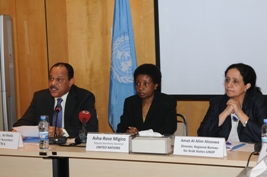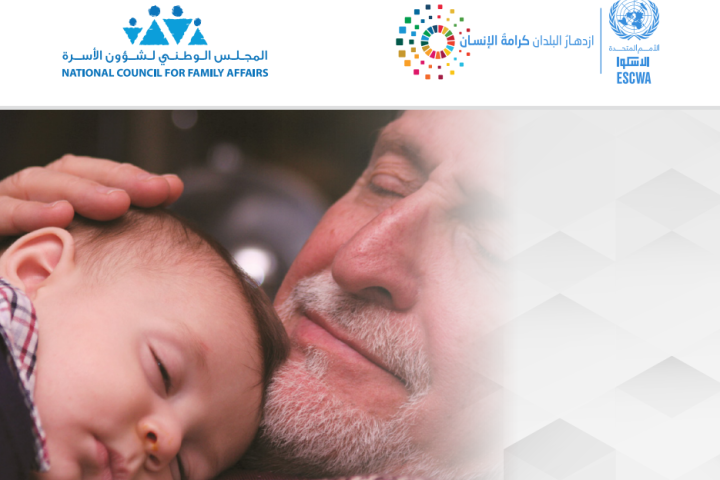United Nations Deputy Secretary-General Asha-Rose Migiro today opened the 13th Regional Coordination Mechanism (RCM) meeting at the UN House-Beirut. The meeting was attended by the directors of regional UN agencies, officials from regional organizations and Lebanese Minister of Education and Higher Education, Bahiya Hariri.
The aim of the two-day meeting is to discuss broad issues of regional relevance, to address the lessons learned and the challenges faced in coordinating joint activities, and to outline the way forward, looking to strengthen the work and role of both the RCM and the Regional Directors Team (RDT)
In addition to Migiro, speakers at the opening session were UN Under-Secretary-General and ESCWA Executive Secretary Bader AlDafa, Assistant Secretary-General and Chair of the RDT, Amat Al Alim Alsoswa.
In her statement, Migiro stressed the need to achieve the Millennium Development Goals (MDGs) by the deadline expiration in 2015, and said the Arab region faces important challenges in achieving the MDGs and addressing the impact of climate change. She also tackled the issue of the financial crisis, which has pushed 100 million people back into extreme poverty, and cost more than 50 million jobs this year alone. "This is why we have put forward a Global Jobs Pact and this is why we are creating a new Global Impact Vulnerability Alert System (GIVAS)."
Migiro reiterated Secretary-General Ban Ki-moon's remarks on regional cooperation and integration, at the Arab Economic and Social Summit, during which he said: “many of the region’s most pressing challenges, from migration to managing water resources, require cross-boundary solutions. Regional cooperation is your strength.”
The Deputy Secretary-General emphasized common grounds among the various UN agencies, united by their "commitment to the right of all children, women and men to live full and dignified lives, with the opportunity and freedom to realize their full potential." She also underlined the importance of ensuring the success of the Copenhagen Summit on Climate Change in December.
AlDafa, for his part, highlighted the critical time that precedes the 2010 MDGs Summit, especially that merely five years separate us from the 2015 deadline for the achievement of these goals. "This is the time to take stock of our progress so far, and put together a coordinated plan for the future."
He went on to say, "this is a critical time for our region and for the globe. The rise in poverty and hunger, the depletion of natural resources, and the volatile effects of climate change are grave challenges to human, economic and social development."
In her statement, Alsoswa said : "our collective challenge is not only to prevent or stem the decline in development gains, but to ensure that the trajectory of development is skewed in one direction-namely, achieving all of the Millennium Development Goals (MDGs) targets." Adding that the Arab region has made several achievements in the development realm during the last two decades, but certain indicators call for pondering when putting together future strategic plans.
She referred to a number of strategic initiatives RDT took to support UN Country teams in responding to national and regional development priorities and accelerating progress towards the MDG targets, such as the nexus and inter-dependence of food security and climate change issues; the youth "bulge" and its development implications; re-thinking the conventional wisdom on, and the development paradigms for, the development challenges faced by middle-income countries; and organizing coherent RDT strategic support to the UNCTs I the preparation of nationally-owned Development Assistance Framework (UNDAF).
Speaking on the RCM, UNIC-Beirut Director Bahaa Elkoussy said: "the meeting will review all the related issues such the adoption of the RCM-TOR, the regional responses to global crises, the Human Rights in the Arab World, thematic interventions etc." He added that "the RCM intends to strengthen coherence and cooperation among UN organizations in the Arab region; exchange information at the inter-agency level; and facilitate coordination and promote joint action in order to better serve the countries of the region and to maximize combined impact of the UN work."
Lebanese Minister of Education and Higher Education Bahiya Hariri also delivered a statement, which touched upon the particularities of the RCM as it studies integration mechanisms and their impact on the ground. "it is now time to ask a simple question, that is 'how do we work together?'. This question reflects the responsibility needed for complementary and coordinated work, and the awareness of the challenges lying ahead," the second Arab economic and social summit in Egypt.




